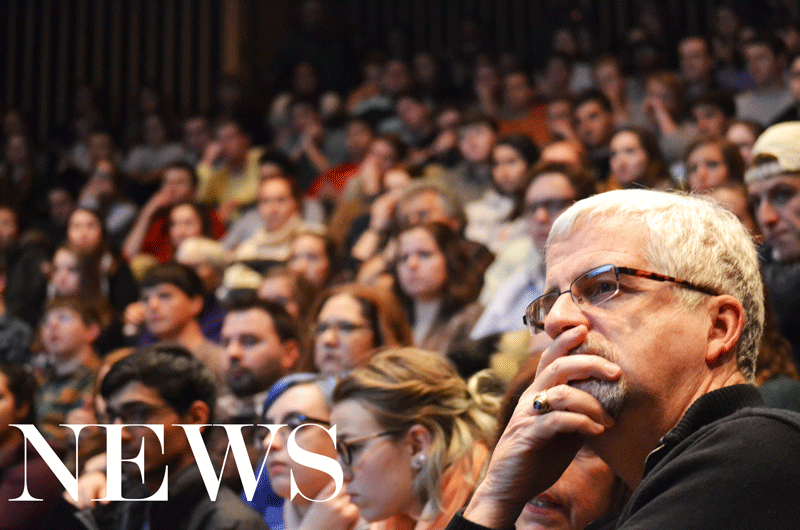Four Sandy Hook fathers discuss loss and violence
January 27, 2016
“You have a voice. There are elements … that are really professing hate and violence … on the flip side of that is love and compassion, which always seems to be quieter; all that voice needs is more voices added to it,” Ian Hockley, a father who lost his son, Dylan, in the 2012 Sandy Hook Elementary School shooting said.
In continuation with the Violence of Hate series, on Jan. 19 Hockley and three other fathers who also lost children in the massacre spoke about grief, forgiveness, family, media, politics, laughter, and the future. Students and faculty filled the Elaine Langone Center Forum, which became so crowded that many had to stand in the back or find places on the floor in order to hear these men share their personal stories and their thoughts on national issues.
“When you’re talking to a big group like this, you hope for a bounce back in energy and it was just coming in waves,” one of the speakers, David Wheeler said.
A predominant, politically-charged subject of the conversation was gun control.
“[T]here are many risk factors that lead to violence … access to firearms is an established risk factor for engaging in violence” yet “[w]e are not, as an American culture, more violent than other first-world countries but we are by so many magnitudes more lethal because of the availability of firearms,” speaker Mark Barden said.
Hockley said that the debate on gun control can polarize people when the issues of guns and rights are the only focuses. Instead, he stated that he favored a discussion about how “we connect society and get it to collectively agree that there should be another way.”
“You move away from that debate about my gun, don’t take my gun, and you move it to that,” Hockley said.
Part of the discussion also focused on how media affects the coverage of violence and the normalization, even glorification, of violence in our culture.
“How many of you guys can name more than two victims of Columbine … more than four victims of Sandy Hook? But I bet you can all name at least one or two mass murderers, and that’s because of the press,” the fourth speaker, Jeremy Richman said.
“[W]hen you watch the news, the first 10 stories will be about the killings, and the robberies, and those things. Then usually, at the end, there’s the good news story … Wouldn’t it be great if that were flipped around? … But they are just feeding what we, as society, want,” Hockley said.
Many students and faculty both listened to and engaged with the speakers, asking them whatever questions came to mind. The speakers, in turn, appeared pleased to have received such a warm reception.
“I would really like to thank the University for allowing us to be a part of this event this week and for being so hospitable … this was a really great group to talk to,” Wheeler said.
“I thought it was very informative and interesting, and I think it really gave students an opening to talk about violence and its consequences,” Colleen Hanisco ’19 said.
The ultimate goal of the event is to continue the conversation about violence.
“[T]his is a multifaceted issue, and the only way that we’re going to see significant change on a great level is if people are willing to have difficult conversations,” Wheeler said.





















